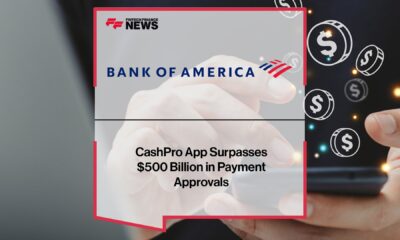Fintech
Synapse is a huge black eye on the industry, but let’s not paint all fintech with the same brush

THE collapse of Synapse represents a serious blow to fintech. The horrifying stories coming out about frozen money for mortgage down payments, college funds, teen savings and more are heartbreaking.
People believed that a fintech would manage their money responsibly, that working with a banking partner that had FDIC insurance meant their money was safe. And while this doesn’t seem like an FTX-type debacle where money was taken and used for other things, there was gross negligence here.
I don’t think it’s an exaggeration to say that this is the worst thing to happen to the fintech sector in its entire history. It’s worse than the 2016 “Mother’s Day Massacre” that saw the oust from the CEO of LendingClub, which caused a couple of years long loss for the entire online lending space.
The Synapse fiasco was a slow, 18-month trainwreck that culminated in the bankruptcy of a fintech middleware company and the inability to reconcile the FBO’s accounts. This means that customers of dozens of fintechs no longer have access to their money.
It is difficult to overestimate the gravity of the situation here. The CFPB and other regulators are likely to take action, and we may even see Congressional involvement. We are nowhere near the end of this story.
I’ll let others weigh in on the latest developments (you should follow Jason Mikula Herewhich is always updated on the news), what I want to do today is to remind everyone of the good that fintech has brought.
When I started writing about this industry in 2010, Stripe didn’t exist, Simple was trying to take off as the first digital bank, there was no Chime (Chris Britt was still working at Green Dot), mobile banking didn’t exist yet. one thing, online personal loans were just starting, as were online loans for small businesses.
We’ve come a long way since then.
So, even though fintech will likely be dragged through the mud in the coming weeks and months on Capitol Hill, I wanted to remind everyone how much positive impact fintech has brought to the world.
Here are some of my favorite fintech developments:
- Mobile banking: Do we really think banks would have full-featured apps today if it weren’t for fintechs pushing the envelope? Their first forays into mobile banking were like the first banking websites, replicating the branch experience on a phone. Today, after following fintech leaders like Chime, PayPal, CashApp, SoFi, and MoneyLion, all major banks have excellent mobile apps.
- Buy Now, Pay Later – Whatever you think of BNPL, it has taken the world by storm over the past decade. Consumers love it and millions of people use this payment method every month. Many banks are now getting involved due to this consumer demand, but once again fintech has made it possible.
- Access to Earned Salary – We still live in the anachronistic world of weekly, semi-annual or monthly salary payments. In a world of APIs and everything on-demand, this is silly. EWA fintechs have addressed this problem, and this may be the most important financial health innovation of the last decade, as millions of people have avoided expensive payday loans simply by being able to access their earned wages.
- Cash Flow Underwriting: I have been closely following innovation in the lending industry for 14 years now, and I think cash flow underwriting is the most important development we have made for financial inclusion. Being able to review detailed banking history gives more people access to credit and better prices for thin file consumers. It’s not mainstream yet but it will be soon.
- Free Stock Trading – The retail investor frenzy we have seen since the start of the pandemic would not have been possible without the advent of free stock trading. Once again, fintech led the way and all traditional players eventually followed suit. This has opened up stock investing to a much larger slice of the market.
- Digital identity verification – Much of today’s world of digital finance would not be possible without robust identity verification and fraud prevention systems. Being able to open an account and start moving money relies on sophisticated digital systems that can authenticate a device and ensure, with remarkable accuracy, that the user is not a criminal.
- Spend Management: This is a category that didn’t really exist ten years ago. But expense management for businesses was a pain point until the advent of Brex, Ramp and Navan. With a fanatical focus on user experience, these companies have repeatedly become unicorns and have saved companies thousands of hours in the process.
- Real-Time Payments – What started with PayPal, then Venmo, Zelle, and CashApp, led to consumer expectations that payments could be free and instant. While true instant payments took a long time to develop in the United States, fintech here laid the foundation that led to the creation of RTP and FedNow.
- Cross-border payments – Staying in the payments space, the rise of Wise, Airwallex and Payoneer has completely disrupted the traditional international money transfer market. These companies have eliminated billions of dollars of costs from the system by making payments around the world quickly and reliably.
- Small Business Capital – After the financial crisis, banks all but exited the small business lending market. This has led to the emergence of companies like OnDeck, Kabbage, BlueVine, and Funding Circle that have been able to fill this gap. Today, established tech companies like PayPal, Square, and Shopify are some of the biggest lenders for small businesses. Banks continue to struggle to serve this space.
These are just ten innovations. I admit there are dozens that could have easily made it onto this list. My purpose here is not to create a definitive list of the top 10 fintech innovations but, instead, to remind everyone that finance today would look very different without the rise of fintech.
None of this is intended to downplay the harm done to consumers as a result of Synapse’s collapse. But it’s a reminder not to throw the baby out with the bathwater. Fintech has done, and will continue to do, great things for consumers and businesses.
Fintech
Lloyds and Nationwide invest in Scottish fintech AI Aveni

Lloyds Banking Group and Nationwide have joined an £11m Series A funding round in Scottish artificial intelligence fintech Aveni.
The investment is led by Puma Private Equity with additional participation from Par Equity.
Aveni creates AI products specifically designed to streamline workflows in the financial services industry by analyzing documents and meetings across a range of operational functions, with a focus on financial advisory services and consumer compliance.
The cash injection will help fund the development of a new product, FinLLM, a large-scale language model created specifically for the financial sector in partnership with Lloyds and Nationwide.
Joseph Twigg, CEO of Aveni, explains: “The financial services industry doesn’t need AI models that can quote Shakespeare, it needs AI models that offer transparency, trust and, most importantly, fairness. The way to achieve this is to develop small, highly tuned language models, trained on financial services data, vetted by financial services experts for specific financial services use cases.
“FinLLM’s goal is to set a new standard for the controlled, responsible and ethical adoption of generative AI, outperforming all other generic models in our selected financial services use cases.”
Robin Scher, head of fintech investment at Lloyds Banking Group, says the development programme offers a “massive opportunity” for the financial services industry by streamlining operations and improving customer experience.
“We look forward to supporting Aveni’s growth as we invest in their vision of developing FinLLM together with partners. Our collaboration aims to establish Aveni as a forerunner in AI adoption in the industry, while maintaining a focus on responsible use and customer centricity,” he said.
Fintech
Fairexpay: Risk consultancy White Matter Advisory acquires 90% stake in fintech Fairexpay

Treasury Risk Consulting Firm White Matter Alert On Monday he announced the acquisition of a 90% stake in the fintech startup Fair payment for an undisclosed amount. The acquisition will help White Matter Advisory expand its portfolio in the area of cross-border remittance and fundraising services, a statement said. White Matter Advisory, which operates under the name SaveDesk (White Matter Advisory India Pvt Ltd), is engaged in the treasury risk advisory business. It oversees funds under management (FUM) totaling $8 billion, offering advisory services to a wide range of clients.
Improve your technology skills with high-value skills courses
| IIT Delhi | Data Science and Machine Learning Certificate Program | Visit |
| Indian School of Economics | ISB Product Management | Visit |
| MIT xPRO | MIT Technology Leadership and Innovation | Visit |
White Matter Advisory, based in Bangalore, helps companies navigate the complexities of treasury and risk management.
Fairexpay, authorised by the Reserve Bank of India (RBI) under Cohort 2 of the Liberalised Remittance Scheme (LRS) Regulatory Sandbox, boasts features such as best-in-class exchange rates, 24-hour processing times and full security compliance.
“With this acquisition, White Matter Advisory will leverage Fairexpay’s advanced technology platform and regulatory approvals to enhance its services to its clients,” the release reads.
The integration of Fairexpay’s capabilities should provide White Matter Advisory with a competitive advantage in the cross-border remittance and fundraising market, he added.
The release also states that by integrating Fairexpay’s advanced technology, White Matter Advisory aims to offer seamless and convenient cross-border payment solutions, providing customers with secure options for international money transfers.
Fintech
Rakuten Delays FinTech Business Reorganization to 2025

Rakuten (Japan:4755) has released an update.
Rakuten Group, Inc. and Rakuten Bank, Ltd. announced a delay in the reorganization of Rakuten’s FinTech Business, moving the target date from October 2024 to January 2025. The delay is to allow for a more comprehensive review, taking into account regulatory, shareholder interests and the group’s optimal structure for growth. There are no anticipated changes to Rakuten Bank’s reorganization objectives, structure or listing status outside of the revised timeline.
For more insights on JP:4755 stock, check out TipRanks Stock Analysis Page.
Fintech
White Matter Advisory Acquires 90% Stake in Fintech Startup Fairexpay

You are reading Entrepreneur India, an international franchise of Entrepreneur Media.
White Matter Advisory, which operates under the name SaveDesk in India, has announced that it is acquiring a 90% stake in fintech startup Fairexpay for an undisclosed amount.
This strategic move aims to strengthen White Matter Advisory’s portfolio in cross-border remittance and fundraising services.
By integrating Fairexpay’s advanced technology, White Matter Advisory aims to offer seamless and convenient cross-border payment solutions, providing customers with secure options for international money transfers.
White Matter Advisory, known for its treasury risk advisory services, manages funds under management (FUM) totaling USD 8 billion.
Founded by Bhaskar Saravana, Saurabh Jain, Kranthi Reddy and Piuesh Daga, White Matter Advisory helps companies effectively manage the complexities of treasury and risk management.
The SaveDesk platform offering includes a SaaS-based FX market data platform with real-time feeds for over 100 currencies, bank cost optimization services, customized treasury risk management solutions, and compliance guidance for the Foreign Exchange Management Act (FEMA) and other trade regulations.
Fairexpay is a global aggregation platform offering competitive currency exchange rates from numerous exchange partners worldwide. Catering to both private and corporate customers, Fairexpay provides seamless money transfer solutions for education, travel and immigration, as well as simplifying cross-border payments via API and white-label solutions for businesses. Key features include competitive currency exchange rates, 24-hour processing times, extensive currency coverage of over 30 currencies in more than 200 countries, and secure, RBI-compliant transactions.
-

 DeFi1 year ago
DeFi1 year agoSwitchboard Revolutionizes DeFi with New Oracle Aggregator
-

 News1 year ago
News1 year agoLatest Business News Live Updates Today, July 11, 2024
-

 DeFi1 year ago
DeFi1 year agoIs Zypto Wallet a Reliable Choice for DeFi Users?
-

 DeFi1 year ago
DeFi1 year ago👀 Lido prepares its response to the recovery boom
-

 Fintech1 year ago
Fintech1 year agoFinTech LIVE New York: Mastercard and the Power of Partnership
-

 DeFi1 year ago
DeFi1 year agoEthena downplays danger of letting traders use USDe to back risky bets – DL News
-

 Fintech1 year ago
Fintech1 year ago121 Top Fintech Companies & Startups To Know In 2024
-

 ETFs1 year ago
ETFs1 year agoGold ETFs see first outing after March 2023 at ₹396 cr on profit booking
-

 Fintech1 year ago
Fintech1 year agoFintech unicorn Zeta launches credit as a UPI-linked service for banks
-

 DeFi1 year ago
DeFi1 year agoTON Network Surpasses $200M TVL, Boosted by Open League and DeFi Growth ⋆ ZyCrypto
-

 ETFs1 year ago
ETFs1 year agoLargest US Bank Invests in Spot BTC ETFs While Dimon Remains a Bitcoin Hater ⋆ ZyCrypto
-

 News1 year ago
News1 year agoSalesforce Q1 2025 Earnings Report (CRM)

















